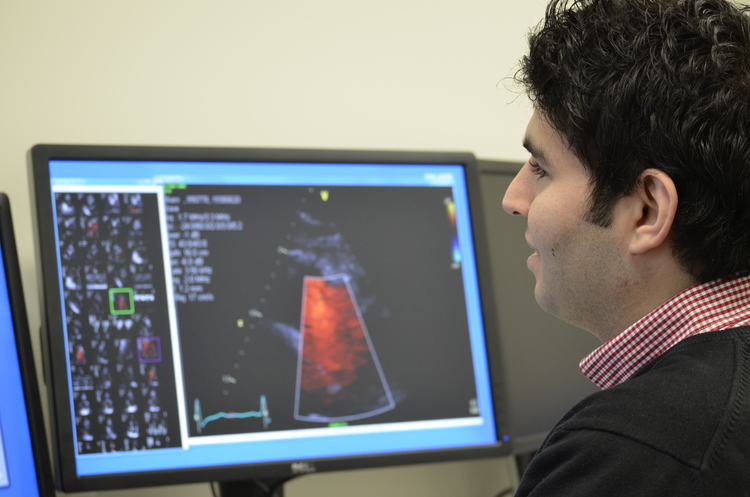Exercise stress echocardiology
What is an echocardiogram (echo)?
An echocardiogram (also known as an echo) is a test that uses sound waves to build up a moving picture of the heart. It is similar to the ultrasound scan used in pregnancy.
What is an exercise echo?
An exercise echo, also known as a stress echo, combines a normal echo with an exercise test. The test helps doctors to find the cause of symptoms during physical stress or exercise.
There are two parts to the test:
- We will ask you to remove your clothes from the waist up and to lie on an echo bed. A number of small sticky patches, called electrodes, will be attached to your chest and connected to the echo machine. The doctor will then perform a normal resting echo.
- We will then ask you to do a treadmill or bicycle exercise so we can perform a second echo to complete the test.
Treadmill exercise
A treadmill is a small moving walkway found in gyms. Before the start of the treadmill exercise, a cardiac physiologist will place nine more electrodes on your chest to record the electrical activity of your heart (electrocardiogram or ECG). Your blood pressure will also be recorded before and at regular times during the test. We will ask you to stand on a treadmill and start walking at a slow speed. The treadmill speed and slope will increase every three minutes.
Once you have reached your target heart rate (calculated based upon your age), we will stop the treadmill. The doctor may also stop the treadmill early if you develop certain symptoms such as chest discomfort, shortness of breath, weakness, dizziness or significant changes in your blood pressure or ECG. As soon as the treadmill exercise is over, we will ask you to lie down on the echo bed as quickly as possible. The doctor will perform the second echo while your heart is still beating fast.
You will relax on the bed until your blood pressure and heart rate return to resting levels. Once you are rested and feel well, the doctor will disconnect you from the equipment.
Bicycle exercise
This test is done on a custom made exercise bed that looks like an echo bed, but has bicycle pedals where your feet will be. You will remain lying on the echo bed during the whole test.
Before the start of the bicycle exercise, a cardiac physiologist will place nine more electrodes on your chest to record the electrical activity of your heart (electrocardiogram or ECG). Your blood pressure will also be recorded before and at regular times during the test. The bottom part of the bed is removed and the bicycle pedals are set up to best fit your legs. We will ask you to pedal while lying down. The bicycle exercise is set so that it gets harder to pedal every three minutes.
Once you have reached your target heart rate (calculated based upon your age), we will ask you to stop then we will perform the second echo. The doctor may also ask you to stop if you develop certain symptoms such as chest discomfort, shortness of breath, weakness, dizziness, leg discomfort or significant changes in your blood pressure or ECG.
It is very important to try your best during the testAt the end of the test, your doctor will ask you to keep pedalling at a slow pace so your muscles can warm down. You will relax on the bed until your blood pressure and heart rate return to resting levels. Once you are rested and feel well, the doctor will end the test and disconnect you from the equipment.
How safe is an exercise echo?
The risk of complications from an exercise echo is very low. It is similar to any form of stress exercise such as climbing stairs or carrying heavy shopping. Medical staff are always present to manage any complications that may occur such as palpitations, unrelieved chest pain or even a heart attack.
Preparing for the test
- It is a good idea to wear comfortable clothing and shoes or trainers that will not slip off your feet
- Some patients bring a cold drink with them to have after the test. Drinking water is available
- We suggest that you do not eat a heavy meal in the two hours before your test
- You may need to stop specific heart medicines one or two days before the test. We will advise you when you book the appointment for your test. If you are unsure, please ask.
The results
The cardiologist will analyse your exercise echo, ECG, and blood pressure results and produce a report for your own doctor.
